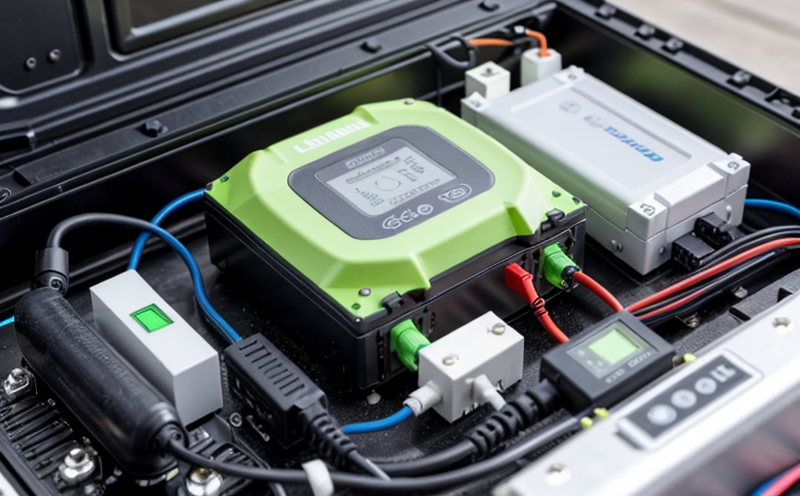JIS C8714 Lithium-Ion Battery Pack Testing
The JIS C8714 standard is a critical document that addresses the testing requirements for lithium-ion battery packs. This standard, which aligns with international practices and standards such as ISO 6358:2019 and IEC 62137, ensures that the batteries meet stringent quality control and safety criteria.
The primary purpose of JIS C8714 testing is to evaluate the performance, durability, and safety of lithium-ion battery packs. This involves a series of tests designed to simulate real-world conditions, ensuring reliability under various stress scenarios. The testing process covers both static and dynamic conditions, including thermal cycling, overcharge/overdischarge, vibration, and short circuit.
For quality managers and compliance officers, JIS C8714 testing ensures that the batteries meet industry standards and regulatory requirements. R&D engineers benefit from this service by validating their designs against real-world performance expectations. The testing process is crucial for ensuring product safety and reliability in applications ranging from consumer electronics to electric vehicles.
The testing protocol involves several key steps, including:
- Preparation of the battery pack according to the standard specifications
- Calibration and validation of test equipment
- Conduction of static and dynamic tests as outlined in JIS C8714
- Data collection and analysis
- Reporting and certification
The results of this testing are essential for manufacturers to ensure their products meet the stringent requirements set by JIS C8714. This service is particularly important given the increasing demand for safe, reliable lithium-ion battery packs in various sectors.
| Test Parameters | Description |
|---|---|
| Thermal Cycling | Simulates extreme temperature variations to assess thermal stability and durability |
| Overcharge/Overdischarge | Evaluates the battery's response under abnormal charging conditions |
| Vibration Testing | Determines the battery pack's resilience to mechanical stress during transportation |
| Short Circuit Test | Assesses the battery's ability to handle electrical faults and prevent catastrophic failures |
The use of JIS C8714 testing is not only a compliance requirement but also a strategic move for manufacturers aiming to ensure product safety, reliability, and performance. By adhering to these standards, companies can build trust with their customers and meet the stringent requirements set by regulatory bodies.
Industry Applications
JIS C8714 Lithium-Ion Battery Pack Testing is applicable across a wide range of industries where lithium-ion batteries are used. The testing ensures that these batteries meet the highest safety and performance standards, which is critical for various applications:
- Consumer electronics
- Automotive industry (electric vehicles)
- Medical devices
- Telecommunications
- Aerospace
| Industry Segment | Main Applications |
|---|---|
| Consumer Electronics | Notebooks, smartphones, and wearables |
| Automotive Industry (Electric Vehicles) | EVs, hybrid vehicles, power systems |
| Medical Devices | Life-saving devices, portable medical instruments |
| Telecommunications | Backup power supplies, mobile base stations |
| Aerospace | Battery systems for aircraft and satellites |
The demand for lithium-ion battery packs in these sectors continues to grow, driven by the increasing focus on renewable energy sources and electric mobility. Ensuring that these batteries meet the stringent requirements of JIS C8714 is crucial for maintaining product safety and reliability.
Competitive Advantage and Market Impact
Adhering to JIS C8714 standards provides significant competitive advantages in the market. By ensuring that their products meet these stringent requirements, manufacturers can:
- Gain a reputation for product safety and reliability
- Avoid costly recalls and product liability issues
- Increase customer trust and loyalty
- Meet regulatory requirements and avoid penalties
- Penetrate new markets with strict safety standards
The market impact of JIS C8714 testing is profound, particularly in sectors like automotive and medical devices. By ensuring that their products meet these stringent requirements, manufacturers can position themselves as leaders in product safety and performance.
Use Cases and Application Examples
| Use Case | Description |
|---|---|
| Consumer Electronics Testing | Testing notebook batteries for thermal stability and durability under extreme conditions. |
| Automotive Industry (Electric Vehicles) | Testing battery packs in electric vehicles to ensure they meet the safety and performance requirements of JIS C8714. |
| Medical Devices | Assessing portable medical devices for their ability to function safely under various stress conditions. |
| Telecommunications | Evaluating backup power supplies in mobile base stations to ensure reliable performance during peak usage periods. |
| Aerospace | Testing battery systems for aircraft and satellites to ensure they meet the stringent requirements of JIS C8714. |
The use cases are diverse, but all focus on ensuring that lithium-ion batteries meet the highest standards of safety and performance. This testing is essential for maintaining product reliability and ensuring compliance with international regulations.





